
Each book is in .pdf format, ready to be read by the Adobe Reader, a.k.a. "Acrobat." Any of them can be read online just by clicking the appropriate icon. Once its text opens in your PC, you can save it there at will for offline reading, giving it whatever name you choose. Be sure to allow time for it fully to download first.
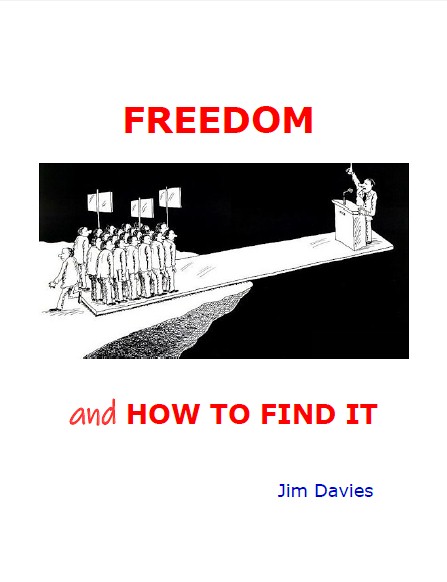 |
Freedom and How To Find It is an e-booklet written in 2024, intended briefly to introduce the facts that government is a terrible idea, and that a free society is both desirable and attainable.
It's priced at $2, and is designed so that when a reader likes it he or she can pass it on to any number of friends and share in that revenue. The hope is that it will rapidly gain a wide readership and so raise the rate of resignations from government employ.
|
The other six are entirely free and first, to complement TOLFA, there are three books in the "Liberty Trilogy":
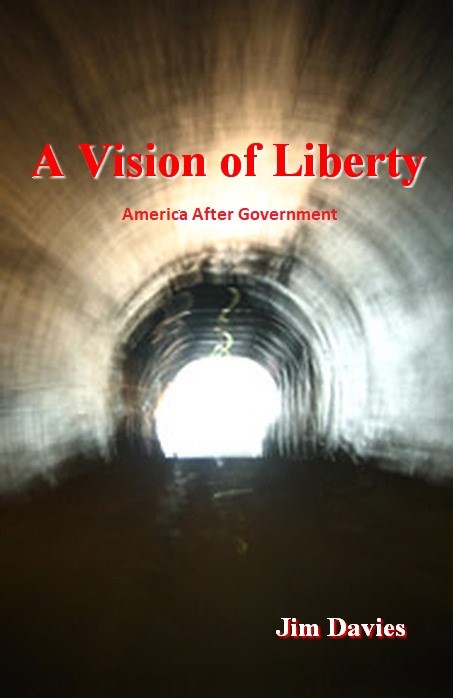 |
A Vision of Liberty outlines what life and society will be like when that transition is complete; the moment will mark a new beginning for all humanity, with progress accelerating every decade, beyond our ability to imagine.
Although logically and chronologically Vision follows Denial and Transition, some may wish to read this book first, in the Liberty Trilogy - to gain first an idea of where the whole process is leading.
Its premise is that on "E-Day" all government in the USA will peacefully evaporate, leaving every member of a well-prepared population to own and operate his or her own life without interference. It attempts to describe how things work out in the first three years of the resulting free society.
Plenty of good libertarian literature validly critiques current government-triggered crises, but Vision places a positive spin and transports the reader into what life is like after the State has vanished; it offers an unique and inspiring insight. This is what good people are working for; this is where we're headed. |
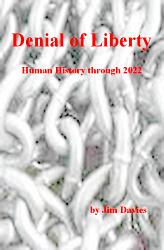 |
Denial of Liberty is a short, sweeping history of the world from the day government first appeared about 10,000 years ago to the present. In every age, Jim shows that human progress was severely impeded by its rules and taxes. Its 167 pages prove over and over that government actively hindered mankind's natural efforts to better his lot and live in prosperity and peace, repeatedly plunging him into warfare, stealing and wasting the product of his labor, so preventing its reinvestment for growth.
We're all repeatedly taught that government is good and necessary, that human society has evolved from savage brutality to a civilized order that is monitored and managed by government; that the State exists to protect us, to administer justice, and provide necessary services the jungle of a free market could never furnish. Denial stands that falsehood on its head.
It's therefore a good book to which to point those hesitating to take the TOLFA course - it prepares the mind. |
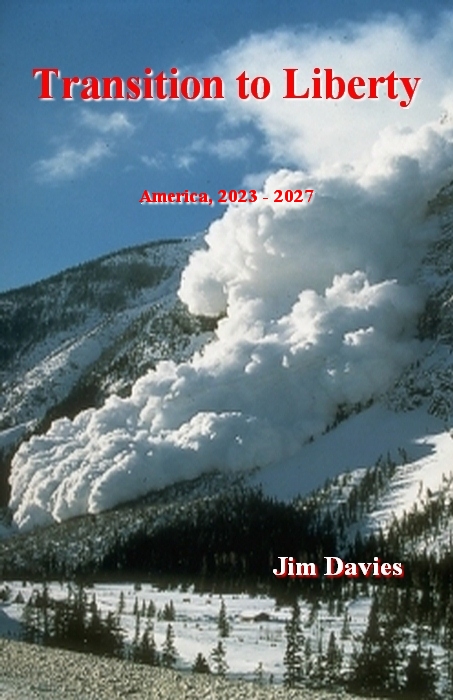 |
Transition to Liberty predicts how, as more and more people graduate from the Freedom Academy and help one friend a year to do the same, government employees will leave their jobs at a rapidly increasing rate - until the whole of government at every level evaporates, ceases to exist.
TOLFA provides not only a needed education about freedom but also the means to achieve it in practice - in a quiet, peaceful but uniquely radical revolution. When government realizes its days are numbered, it will do everything it can to stifle that revolution. In Transition, Jim imagines as many as possible of the tricks it may pull, and shows the thrilling story of why every one of them will be wholly inadequate to arrest the avalanche of liberty.
Many people suppose that wonderful though a free society would be, it will never be real because government has the power to prevent it ever happening. Read and judge for yourself: the opposite is the case. On TOLFA's simple assumptions, there is nothing government can do to stop it. |
The three books above form the Liberty Trilogy, and tie in closely with The On Line Freedom Academy, which all students download and distribute to those interested to join themselves. If the present reader hasn't done so yet, the next important step is to join it and graduate; go to TOLFA.us.
Jim wrote three other books, below, about subjects he has found interesting; they relate to the "freedom" theme less directly.
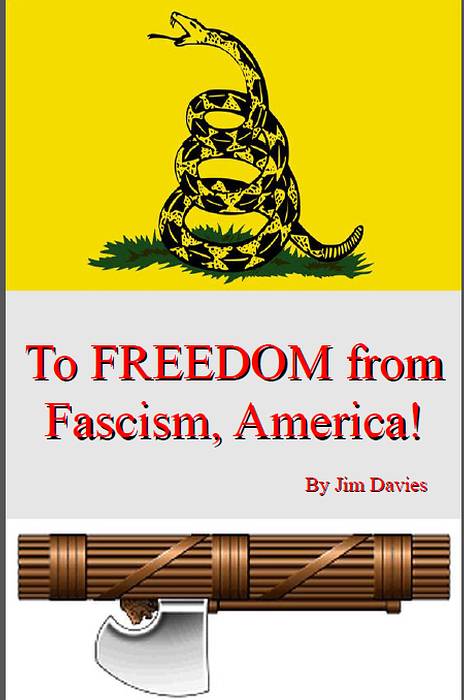 |
His 2010 e-book (now in 2025 in its second edition) begins where the outstanding movie "America: From Freedom to Fascism" left off. Its scope...
- Shows what "fascism" means, systematically and in some detail
- Explores how fascism permeates life in America, and when it began
- Considers what would be an ideal alternative to fascism, and
- Proposes straightforward action to take that will bring it about
Far from merely amplifying crude anti-police slogans such as "fascist pigs", this work gets down to the root and history of what fascism really means and how fully it has penetrated American life.
While deeply admiring the work Aaron Russo did in his documentary, Jim suggests that he understated the problem we face - it's actually much worse.
At the same time, this book holds out very serious hope for radical reform in the immediate future, which Jim sees as almost unimaginably bright, spells out what each person can do to help it happen, and why success is inevitable within the lifetimes of most readers. That rational optimism makes the book unique. |
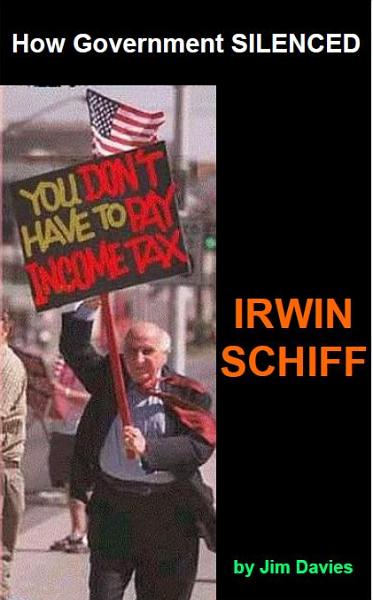 |
Another recurrent theme heard today is that okay, government is bad and getting worse but we can't do without it altogether; so let's slash it back down to the size and shape it is supposed to have by the US Constitution.
The most courageous and determined man Jim ever met with that purpose was Irwin Schiff, whose discovery that the income tax (which funds nearly half the Federal Government) has never been enacted into law led him to challenge it head-on. Stop that flow of revenue, and the result would be a far smaller régime. The book details Irwin's discoveries and his legal battles and eventual failure; a failure which, however, demonstrated vividly that a measured limitation of government is not possible.
Ultimately, it's all or nothing. |
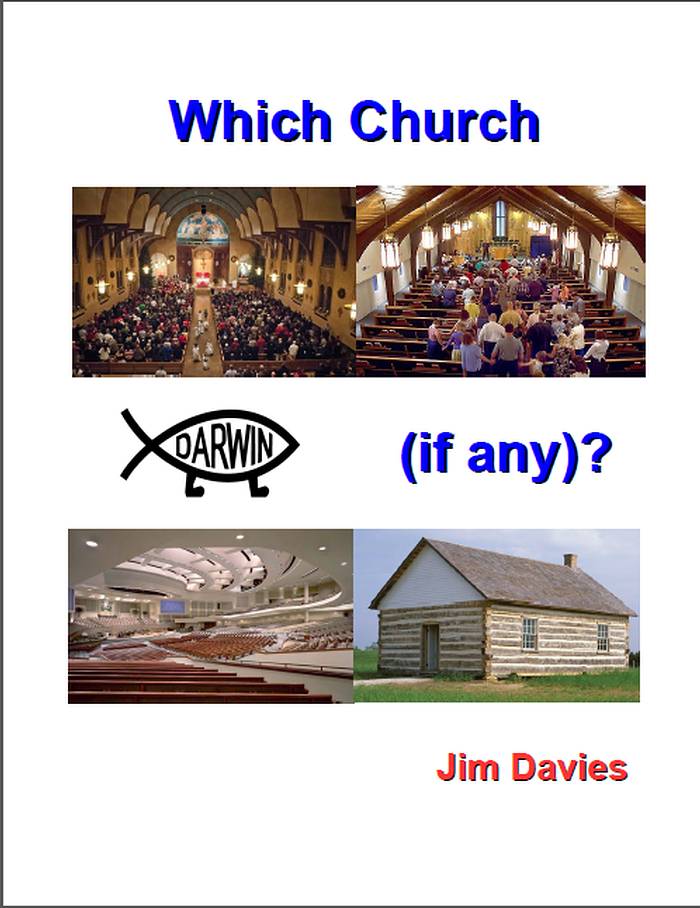 |
To one degree of depth or another, everyone thinks about religion at some time in their lives, and this book is intended to help people clarify that thought process.
It does so only for the prevailing Christian religion and its main denominations (otherwise the scope would be too large!) and shows its core beliefs and suggests a systematic way to test their credibility. As such it will assist
- teenagers preparing for Confirmation or otherwise deciding about religion, and
- recent immigrants (eg Muslims) interested to understand the religion around them, and to accept or reject it.
|
Liberty Banquet







